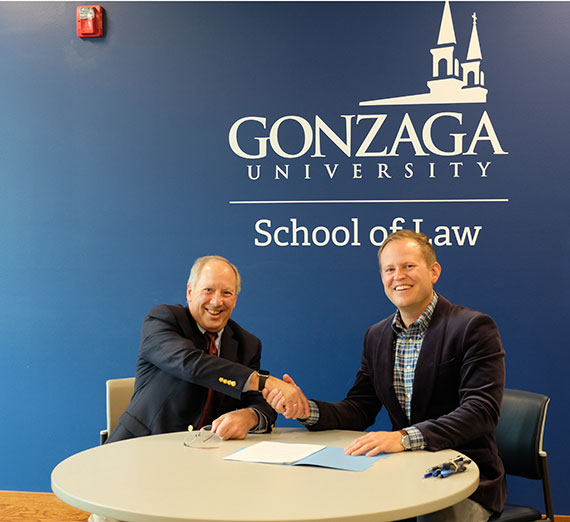Gonzaga Law School Announces New Children’s Rights Justice Initiative

Today the Gonzaga University School of Law, the Washington State Office of Civil Legal Aid (OCLA) and the Washington State Office of Public Defense (OPD) signed a memorandum of understanding to create the Children and Parents Rights and Justice Initiative (CRJI), designed to fill the need for attorneys specifically trained to represent and advocate for children and parents in dependency proceedings and across other areas of law.
The initiative will create the only program in Washington for law students to focus on a track of supporting children and parents’ rights, an area of the law that’s reached crisis status both nationally and regionally due to the lack of qualified attorneys well-versed in working within the child welfare system.
That crisis was compounded in Washington when the 2021 legislature established a statewide right to court-appointed attorneys for children in dependency cases. OCLA was given five years to fully implement the program, creating an instant need for 100 full-time attorneys. A substantial number of attorneys already working with children are retiring, exacerbating the issue.
“Children’s rights and parental justice is a critical issue facing our state and region,” said GU Law School Dean Jacob Rooksby. “Through this unique partnership, Gonzaga Law School has an exciting opportunity to educate interested students to become leaders and advocates in this specialized area of the law, exposing them along the way to trauma- and equity-informed representation best practices.”
Jim Bamberger, director of OCLA, believes Gonzaga is a natural home for the CRJI, given both its mission and its location. Both OPD, which is responsible for recruiting, training and contracting with attorneys to represent parents, and OCLA, which does the same with attorneys representing children, are having difficulty filling their needs, he notes. And those difficulties are even more prevalent in rural and remote locations of the state.
“This problem will not solve itself. It will only get worse,” Bamberger said. “Gonzaga is located in Eastern Washington, and its graduates are more likely to stay and practice in the area, including the adjacent rural areas, where the lack of attorneys is increasingly acute.”
Gonzaga’s law school has a longstanding commitment to public service through myriad academic, experiential and community-based programs, exemplifying Gonzaga’s Jesuit and humanistic mission. Initiating a program to train and place into practice attorneys dedicated to justice for children, parents and families, Bamberger added, “is a logical extension of the law school’s culture and commitment to equity and justice.”
Rooksby agrees.
“Our shared work in this important area with the Washington State Office of Public Defense and the Office of Civil Legal Aid is a natural outgrowth of the law school’s mission and our Center for Human Rights, helping students put their passion into practice,” Rooksby said.
